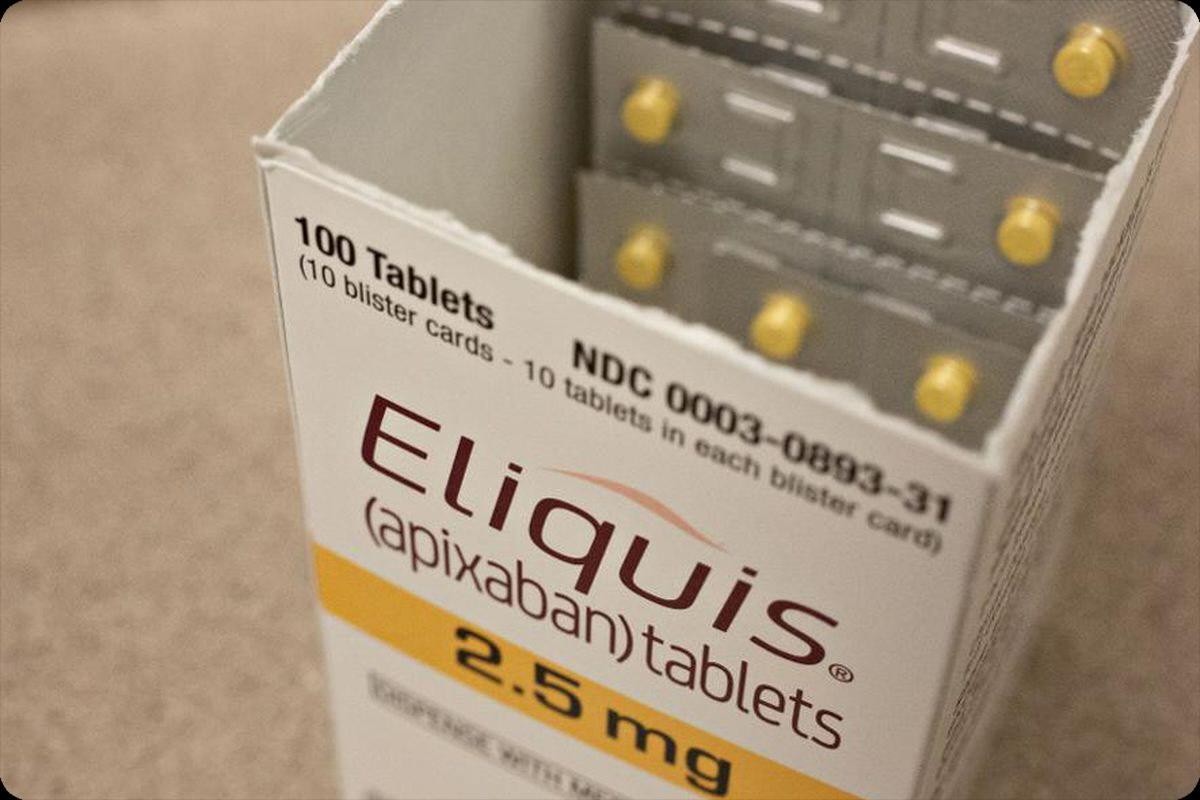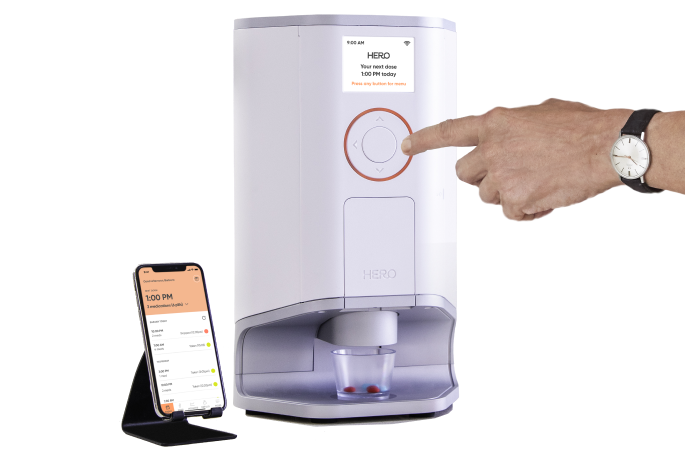Unveiling Eliquis Side Effects: What You Need to Know About This Blood Thinner

Explore both the common and rare side effects of Eliquis. Learn how this blood thinner helps prevent blood clots and why it's essential to monitor your health while taking Eliquis. Understand the side effects, from minor inconveniences to serious health risks. Learn how to manage these effects and when to consult your doctor.
Understanding Eliquis: Its Role in Preventing Blood Clots
Eliquis, also known by the generic name Apibaxan, is an anticoagulant drug that decreases the risk of blood clotting by selectively inhibiting both free and bound factor Xa, as well as prothrombinase, independent of antithrombin III. This interference with the normal clotting process prevents or undoes coagulation, reducing the likelihood of developing life-threatening conditions such as strokes, heart attacks, and pulmonary embolisms due to blood clots. It is part of a class of medications called direct oral anticoagulants (DOACs) that are effective alternatives to traditional blood thinners like warfarin.
What is Eliquis and how does it work?
Eliquis works by selectively inhibiting both free and bound forms of factor Xa, as well as prothrombinase, independent of antithrombin III. By doing so, it prevents the formation of thrombus or blood clots. It is part of a class of medications called direct oral anticoagulants (DOACs) that are effective alternatives to traditional blood thinners like warfarin.
It's crucial to follow healthcare professional advice when taking Eliquis because improper usage can lead to serious side effects like excessive bleeding. Regular check-ups may be necessary to monitor how well your blood is clotting and adjust dosage accordingly.
Conditions treated by Eliquis: Atrial Fibrillation, Deep Vein Thrombosis, and Pulmonary Embolism
Eliquis is prescribed for various conditions where there's a high risk of blood clot formation. These include:
- nonvalvular atrial fibrillation (NVAF), which can lead to stroke
- deep vein thrombosis (DVT), often occurring after hip or knee replacement surgery
- pulmonary embolism (PE), a potentially life-threatening condition caused by a blood clot blocking an artery in the lungs.
The benefits of taking Eliquis include its effectiveness in lowering the risk of stroke in patients with nonvalvular atrial fibrillation and preventing recurrent blood clots in patients with DVT or PE. Moreover, clinical trials have shown that Eliquis causes less major bleeding compared to warfarin. By preventing the formation of new blood clots and stopping existing ones from growing larger, Eliquis helps reduce the risk of serious complications associated with these conditions. However, it's important to note that while Eliquis greatly decreases the risk of blood clotting, it doesn't completely prevent them.
It is essential to be aware of the potential risks associated with Eliquis, such as bleeding. Patients should avoid injuries that may cause significant bleeding and be cautious about concurrent use of medications that affect blood clotting, which can further increase this risk.

Common Eliquis Side Effects and How to Manage Them
Minor bleeding: nosebleeds, bleeding gums, and easy bruising
Eliquis is used to prevent dangerous blood clots that can lead to serious medical problems such as heart attack and stroke. However, like any medication, it comes with potential side effects. Understanding these side effects is crucial for patients taking this drug.
One of the most common side effects of Eliquis is minor bleeding. This could range from minor cuts taking longer to stop bleeding to more severe internal bleeding. For example, if you fall and hit your head while on Eliquis, even if there's no visible blood, internal bleeding may occur inside your skull.
To manage these side effects:
- Use a soft-bristle toothbrush and waxed dental floss to minimize gum bleeding during oral hygiene routines.
- Avoid activities with a high risk of injury or contact sports that may lead to bruises.
- If you experience frequent nosebleeds, try using a humidifier in your home to keep the air moist.
Nausea, dizziness, and headaches: tips for coping
Some patients taking Eliquis may experience nausea, dizziness, or headaches as side effects. These symptoms usually subside once your body adjusts to the medication. However, if they persist or become bothersome, consult your healthcare professional for advice on how to manage them. Here are some tips to help cope with these symptoms:
- Stay hydrated by drinking plenty of water throughout the day.
- Eat smaller meals more frequently instead of large meals to help reduce nausea.
- Practice relaxation techniques like deep breathing exercises or meditation to alleviate headache pain.
- Get up slowly from sitting or lying down positions to minimize dizziness.
- Consult your healthcare professional if these symptoms persist or worsen.
To minimize the risk of experiencing these side effects, it's essential to follow your doctor's instructions regarding dosage and administration carefully. Remember to always consult your doctor before making any changes in your medication routine or trying new remedies for managing side effects.
Understanding the common side effects of Eliquis can help individuals better manage their treatment plan and ensure they're taking the medication safely. Remember to always consult with your doctor before making any changes in your medication routine or trying new remedies for managing side effects.
Complex med schedule? We solved it.
Hero’s smart dispenser reminds you to take your meds and dispenses the right dose, at the right time.

Serious Eliquis Side Effects: When to Seek Medical Attention
While Eliquis is effective in reducing the risk of stroke and systemic embolism in patients with nonvalvular atrial fibrillation, it can also lead to some serious side effects.
Severe bleeding: symptoms and emergency response
One of the most significant risks associated with Eliquis is major bleeding. This may manifest as heavier than usual menstrual bleeding, severe headache or stomach pain, coughing up blood, or uncontrolled bleeding from cuts. In case of severe internal bleeding, you might notice black, tarry stools or vomit that looks like coffee grounds. These are signs that you should contact your healthcare professional right away.
It's important to note that certain factors may increase this risk such as age, concurrent use of other drugs affecting blood clotting like NSAIDs, and pre-existing conditions like kidney disease or a history of stomach ulcers. Therefore, always consult your healthcare professional before starting Eliquis therapy. Some symptoms of severe internal bleeding may include:
- Unusually heavy menstrual bleeding
- Severe headache or stomach pain
- Vomiting blood or material that looks like coffee grounds
- Coughing up blood
- Head injury without visible bleeding
In case of severe internal bleeding, you might notice black, tarry stools or vomit that looks like coffee grounds. These are signs that you should contact your healthcare professional right away.

Allergic reactions: recognizing the signs and what to do
Although rare, some people may have unusual or allergic reaction to Eliquis. Allergic drug reactions account for 5 to 10% of all adverse drug reactions. Signs of an allergic reaction to Eliquis may include:
- Hives or rash
- Facial or throat swelling
- Wheezing or difficulty breathing
- Light-headedness or dizziness
- Vomiting and shock
If you suspect that you're having an allergic reaction to Eliquis, seek immediate medical help. Anaphylaxis, the most severe form of an allergic reaction, can be life-threatening and requires urgent treatment.
Moreover, if you're scheduled for any spinal surgery or spinal procedures such as spinal tap or epidural anesthesia while on Eliquis treatment, inform your doctor beforehand as it could cause serious issues around your spinal cord leading to long-term or permanent paralysis.
While Eliquis is effective in preventing blood clots and related complications, it's essential to be aware of its potential side effects. If you experience any severe symptoms or suspect an allergic reaction, don't hesitate to seek medical attention immediately.
Remember to always inform your healthcare provider about any unusual or allergic reactions you have had in the past before starting new medications. Additionally, provide them with a list of all current medications to avoid potential drug interactions.
Drug Interactions with Eliquis: What to Avoid
Nonsteroidal anti-inflammatory drugs (NSAIDs) and increased bleeding risk
While taking Eliquis, it is essential to avoid nonsteroidal anti-inflammatory drugs (NSAIDs) such as ibuprofen, naproxen, and aspirin. When combined with Eliquis, NSAIDs may increase the risk of bleeding complications. For example, people taking NSAIDs such as naproxen or diclofenac have a higher risk of developing ulcers, bleeding, or holes in the stomach or intestine. These problems may occur without warning symptoms and could lead to death. If you need pain relief or have a fever, consult your healthcare professional for alternative options that are safe to use alongside Eliquis.
Before starting a medication like Eliquis, it's crucial to understand the potential interactions and precautions associated with its use. This blood thinner is often prescribed for conditions such as nonvalvular atrial fibrillation and to treat blood clots after knee or hip replacement surgery. However, certain medications and substances can interact with Eliquis, potentially leading to serious side effects.
Other medications affecting blood clotting: anticoagulants, antiplatelet drugs, and more
Eliquis may interact with other medications that affect blood clotting, including other anticoagulant drugs like warfarin and heparin, as well as antiplatelet drugs such as clopidogrel. Combining these medications with Eliquis can further increase the risk of bleeding complications. Always inform your healthcare provider about all the medicines and supplements you are taking to prevent potential drug interactions.
Grapefruit juice, St. John's Wort, and other substances to avoid while taking Eliquis
When taking Eliquis, it's essential to be aware of certain lifestyle factors that can impact the medication's effectiveness and your overall health. Two key areas to consider are alcohol consumption and dietary restrictions, particularly regarding grapefruit juice.
By being mindful of these lifestyle considerations, you can minimize the risk of complications while taking Eliquis and maintain a healthy balance in managing blood clots and other related conditions.
While most foods do not interact negatively with Eliquis, it is important to avoid grapefruit, grapefruit juice, marmalades, limes, and pomelos while taking this medication. These fruits prevent the breakdown of apixaban (the active ingredient in Eliquis) and may increase side effects. Grapefruit can interfere with enzymes responsible for breaking down medications like Eliquis, leading to higher drug levels in the body and increasing the risk of side effects.
To ensure safety while taking Eliquis:
- Limit alcohol intake or avoid it altogether.
- Avoid consuming grapefruit or other citrus products known to interact with the medication.
- Consult your healthcare professional about any potential food or drink interactions with Eliquis.
- Monitor your diet and make necessary adjustments to avoid complications.
Alcohol consumption and its impact on blood clotting
Alcohol may increase the risk of bleeding in your stomach and intestines by irritating the tissue. It may also act as a blood thinner after just one or two drinks, decreasing platelet clumping. Consuming more than two servings of alcohol per day increases your risk of developing a blood clot. The American Blood Clot Association recommends using extreme caution when drinking if you have a clotting disorder. It is best to avoid alcohol while taking Eliquis, but an occasional small drink is probably safe. Similarly, St. John's Wort may reduce the effectiveness of Eliquis, making it less efficient in preventing blood clots. It is crucial to discuss any dietary restrictions or potential interactions with your healthcare provider before starting Eliquis treatment.
Moreover, some substances might reduce the effectiveness of this drug when co-administered. For instance, ritonavir-boosted Nirmatrelvir may decrease the efficacy of clopidogrel - an antiplatelet drug that prevents blood clotting - which could be problematic for patients at high risk of thrombosis who are also on Eliquis treatment.
Before starting Eliquis therapy or adding any new medication to your regimen while on this drug, always consult your healthcare provider. They will help weigh the benefits against potential risks and guide you towards making informed decisions about your health.
Pre-surgery considerations and temporary discontinuation of Eliquis
If you're scheduled for surgery or a dental procedure, it's crucial to discuss your use of Eliquis with your healthcare provider. They may recommend temporarily stopping the medication to reduce the risk of excessive bleeding problems during the procedure. However, this decision should be made carefully, as discontinuing Eliquis can increase the risk of blood clots.
It's essential to be aware of potential drug interactions and precautions when taking Eliquis. Always consult your healthcare professional before starting or stopping any medications while on Eliquis, and inform them about all other drugs you're currently using. By following these guidelines, you can minimize risks and ensure that Eliquis is effectively preventing dangerous blood clots in your body.
Eliquis Dosage and Missed Dose Guidelines
The dosage of Eliquis depends on the specific condition being treated:
- For prevention of deep venous thrombosis after hip replacement surgery: Adults should take 2.5 mg twice daily for 35 days, starting 12 to 24 hours after surgery.
- For prevention of deep venous thrombosis after knee replacement surgery: Adults should take 2.5 mg twice daily for 12 days, starting 12 to 24 hours after surgery.
- For prevention of recurrent deep venous thrombosis and pulmonary embolism: Adults should take 2.5 mg twice daily after at least six months of treatment.
- For prevention of strokes and blood clots in patients with nonvalvular atrial fibrillation: Adults typically take 5 mg twice daily; however, those with certain characteristics may be prescribed a lower dose of 2.5 mg twice daily.
It's crucial to follow your doctor's instructions and take Eliquis as prescribed. If you have any questions or concerns about your dosage, consult with your healthcare professional. Using a pill dispenser like Hero can help ensure proper dosage and timing of Eliquis, especially for those managing multiple medications.

Special Considerations for Patients on Eliquis
Eliquis is used to prevent blood clots in patients with various medical conditions. However, certain situations require special considerations when taking this medication.
Precautions before surgery or dental procedures
Patients on Eliquis should inform their healthcare professional about the medication before undergoing any surgical or dental procedure. In some cases, it may be necessary to temporarily stop taking Eliquis prior to the procedure to minimize the risk of excessive bleeding. It's essential to follow your doctor's recommendations regarding stopping and resuming Eliquis use around these procedures.
Kidney disease, liver disease, and other factors affecting Eliquis use
Certain medical conditions can affect how your body processes and responds to Eliquis. For example, patients with kidney or liver disease may need dose adjustments or additional monitoring while taking this medication.
Other factors that could impact the effectiveness or safety of Eliquis include age, concomitant use of nonsteroidal anti-inflammatory drugs (NSAIDs), and a history of gastrointestinal bleeding. Always discuss your medical history and any other medications you are taking with your healthcare provider to ensure safe and effective use of Eliquis.
While Eliquis is an effective treatment for preventing blood clots in many patients, it's crucial to be aware of special considerations and precautions related to its use. Always consult your healthcare professional before undergoing surgery or dental procedures, and inform them about any existing medical conditions or medications that could impact Eliquis's effectiveness. By staying informed and following your doctor's guidance, you can safely manage your health while taking this medication.
Transitioning from Eliquis to Other Blood Thinners Safely
Switching from Eliquis to another blood thinner requires careful planning and medical supervision due to potential risks such as increased clotting or bleeding events. For example, when transitioning from warfarin to apixaban (Eliquis), it is recommended that warfarin be discontinued and apixaban started when the INR (International Normalized Ratio) is less than 2.0. Similarly, if switching from parenteral anticoagulation like low-molecular weight heparin (LMWH) to a NOAC like Eliquis, start the NOAC when the next dose of LMWH would have been due. Always consult with your healthcare professional before making any changes in your medication regimen.
Living with Long-Term Use of Eliquis
Long-term use of any medication, including Eliquis, requires careful management and regular communication with your healthcare provider. Anticoagulants like Eliquis are extremely effective in preventing life-threatening conditions such as stroke, pulmonary embolism, and heart attack. However, the most common side effect risk with any anticoagulant is bleeding. Therefore, it's crucial to take precautions when on long-term therapy.
For example, maintaining an up-to-date list of all your medicines and supplements can help prevent drug interactions that may affect how Eliquis works or increase your risk of bleeding. This list should be brought to all health care visits for discussion with your provider.
Potential Long-Term Side Effects of Eliquis
The most significant potential long-term side effect of taking Eliquis is bleeding. Since blood thinners slow the clotting of blood, unwanted and sometimes dangerous bleeding can occur with the use of these medications.
Other potential risks exist depending on individual health conditions and other medications used concurrently. For instance, certain conditions might keep you from taking certain anticoagulants. It's important to discuss these risks thoroughly with your healthcare provider.
Maintaining Quality of Life While on Long-Term Eliquis Therapy
Despite the potential risks associated with long-term use of Eliquis, many patients continue to lead fulfilling lives while managing their treatment regimen effectively. Key strategies include taking the medication as directed by a doctor and having regular check-ups to monitor its effects.
Moreover, lifestyle changes can also play a significant role in managing symptoms related to underlying conditions treated by Eliquis. For instance, individuals diagnosed with chronic venous insufficiency are advised to elevate their legs above heart level several times per day to reduce pressure in leg veins.
Remember that living well while on long-term Eliquis therapy involves balancing medical needs with personal preferences under the guidance of a trusted healthcare professional.

Remember that living well while on long-term Eliquis therapy involves balancing medical needs with personal preferences under the guidance of a trusted healthcare professional.

Hero Pill Dispenser: Simplifying Medication Management for Eliquis Users
Managing medications like Eliquis can be challenging, especially when dealing with potential side effects and drug interactions. Hero's pill dispenser is designed to simplify this process by ensuring proper dosage and timing of your medications.
How Hero can help ensure proper dosage and timing of Eliquis
Using a smart pill dispenser like Hero can greatly improve medication adherence for those taking Eliquis or other medications. The device automatically dispenses the correct dose at the right time, reducing the risk of missed doses or accidental overdosing. By maintaining a consistent schedule, patients can minimize Eliquis side effects and maximize its effectiveness in preventing blood clots. Additionally, the accompanying app allows users to track their medication history and receive reminders, further supporting adherence to their healthcare professional's recommendations.
Benefits of using Hero for managing multiple medications
Many individuals taking Eliquis may also be prescribed other medications to manage various health conditions. Juggling multiple prescriptions can be overwhelming and increase the likelihood of mistakes. With Hero's pill dispenser, users can:
- Store up to 10 different medications in one device
- Customize dispensing schedules for each medication
- Receive notifications when it's time to take a specific medication
- Monitor medication intake through the mobile app
By simplifying medication management, Hero helps reduce the risk of drug interactions and ensures that patients are taking all necessary precautions when combining Eliquis with other drugs. This level of organization and support can lead to better overall health outcomes and peace of mind for both patients and caregivers.
Incorporating Hero's pill dispenser into your daily routine can significantly improve medication management for those taking Eliquis and other prescriptions. By ensuring proper dosage, timing, and tracking of medications, patients can focus on their health without worrying about potential complications from missed doses or drug interactions.
Hero is indicated for medication dispensing for general use and not for patients with any specific disease or condition. Any reference to specific conditions are for informational purposes only and are not indications for use of the device.
The contents of the above article are for informational and educational purposes only. The article is not intended to be a substitute for professional medical advice, diagnosis, or treatment. Always seek the advice of your physician or other qualified clinician with any questions you may have regarding a medical condition or its treatment and do not disregard professional medical advice or delay seeking it because of information published by us. Hero is indicated for medication dispensing for general use and not for patients with any specific disease or condition. Any reference to specific conditions are for informational purposes only and are not indications for use of the device.



